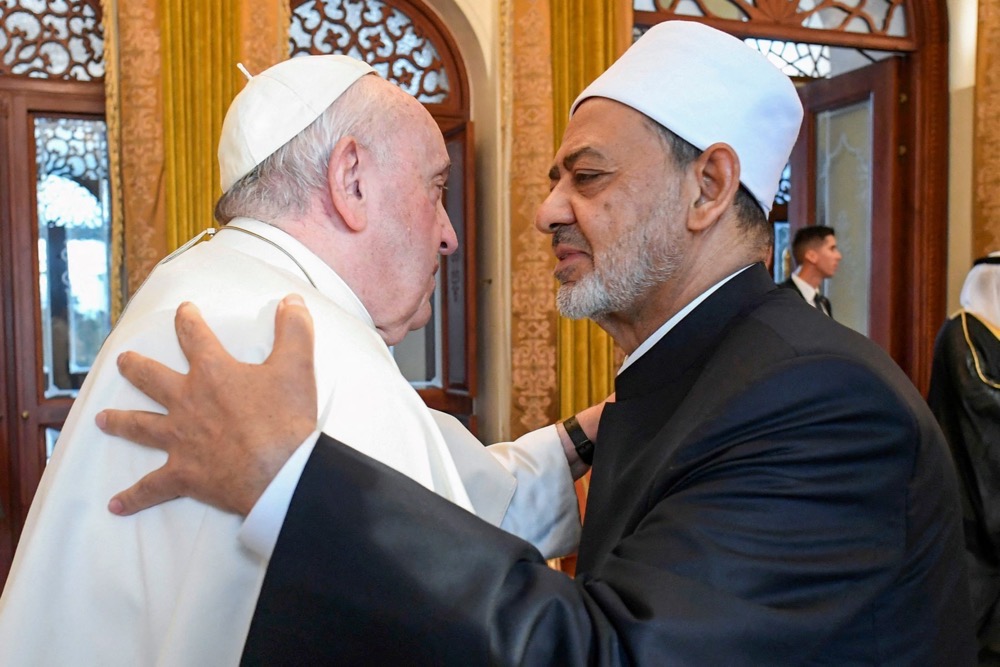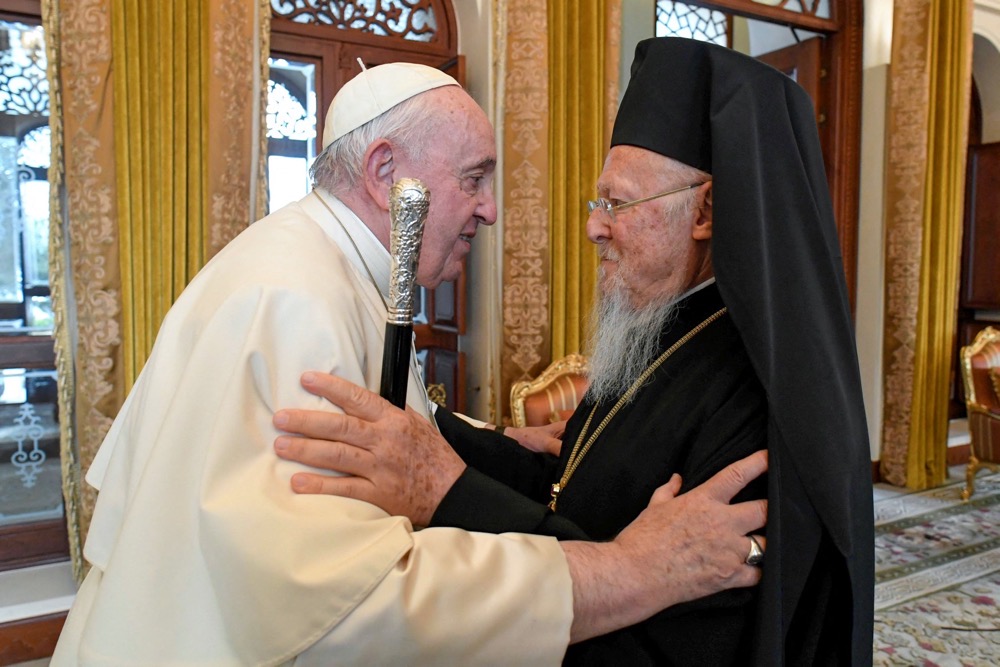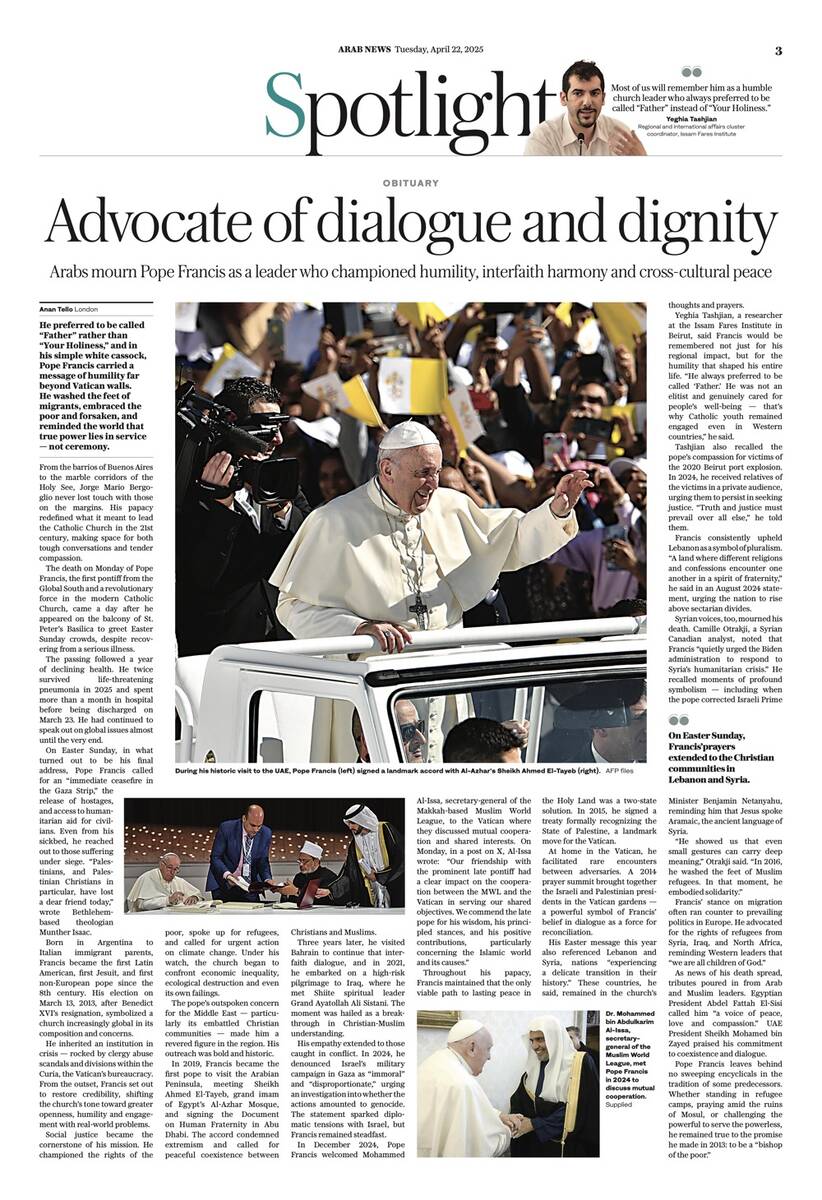RIYADH: Saudi Arabia’s King Salman and Crown Prince Mohammed bin Salman sent cables of condolences on the death of Pope Francis on Monday, the Saudi Press Agency reported.
The Muslim World League secretary-general Dr. Mohammed bin Abdulkarim Al-Issa, who met the Pope at the Vatican in December 2024, told Arab News that their friendship had strengthened cooperation between the League and the Vatican in “shared goals ... championing just humanitarian causes and promoting the values of coexistence and global peace, in the face of the ideas and practices of religious and civilizational conflict and strife.”
The Pope was a man of “wisdom, just stances, and positive contributions, particularly to the Islamic world and its causes,” Al-Issa said.
The Muslim Council of Elders, headed by Egypt’s Grand Imam Ahmed Al-Tayyeb, also mourned Pope Francis’ passing and extended their condolences to “the leaders of the Catholic Church, our Christian brethren, and all advocates of peace and coexistence worldwide.”
Pope Francis and Sheikh Ahmed co-authored the historic Document on Human Fraternity, widely regarded as one of the most significant documents in modern human history.
“Pope Francis devoted his life to serving humanity and advancing the values of dialogue, tolerance, coexistence, peace, and human fraternity while he also tirelessly supported the vulnerable, needy, refugees, and the displaced, embodying a singular example of compassion and becoming a historic religious figure whose enduring humanitarian legacy will inspire future generations,” the group said in a statement on X.
Egypt’s president Abdel Fattah El-Sisi also offered his condolences following the death of Pope Francis on Monday.
“Pope Francis was a voice of peace, love and compassion,” said El-Sisi.
Sheikh Mohamed bin Zayed, President of the UAE, said Francis dedicated his life to promoting the principles of peaceful coexistence and understanding.
“I extend my deepest condolences to Catholics around the world on the passing of Pope Francis, who dedicated his life to promoting the principles of peaceful coexistence and understanding. May he rest in peace,” said Sheikh Mohamed via statment on X.
Prime minister of UAE Sheikh Mohammed bin Rashid Al-Maktoum said Pope Francis was a great leader whose compassion and commitment to peace touched countless lives.
In a statement on X, Sheikh Mohammed said “his legacy of humility and interfaith unity will continue to inspire many communities around the world.”
Jordan’s King Abdullah II, on X, meanwhile said: “Deepest condolences to our Christian brothers and sisters around the world. Pope Francis was admired by all as the Pope of the People. He brought people together, leading with kindness, humility, and compassion. His legacy will live on in his good deeds and teachings.”
Lebanon’s Christian President Joseph Aoun mourned the death on Monday of Pope Francis, a “dear friend and strong supporter” of the crisis-hit multi-confessional country.
“We will never forget his repeated calls to protect Lebanon and preserve its identity and diversity,” Aoun – the Arab world’s only Christian president – said in a statement on the presidency’s X account, calling Francis’s death “a loss for all humanity, for he was a powerful voice for justice and peace” who called for “dialogue between religions and cultures”.
Palestinian president Mahmoud Abbas meanwhile paid tribute to Pope Francis, calling him a “faithful friend of the Palestinian people,” the official Palestinian news agency Wafa reported.
Palestinian Christians in Gaza on Monday mourned the death of the Pope, who had maintained close and consistent video contact with the small Christian community in the territory throughout the ongoing war.
Since the outbreak of fighting between Israel and Hamas, Francis had regularly called Gaza’s Christians, often several times a week, offering prayers, encouragement, and solidarity.
“Today, we lost a faithful friend of the Palestinian people and their legitimate rights,” Abbas said, noting that Pope Francis “recognized the Palestinian state and authorized the Palestinian flag to be raised in the Vatican.”
Turkish President Recep Tayyip Erdogan hailed Pope Francis for his efforts to further dialogue between different faiths.
Iran also offered its condolonces. Israeli President Isaac Herzog praised the deceased pope on Monday as “a man of deep faith and boundless compassion.”
Indonesia’s President Prabowo Subianto on Monday expressed condolences over the death of Pope Francis.
“The Pope’s message of simplicity, pluralism, favoring the poor and caring for others will always be an example for all of us,” the president said in an Instagram post.
Grief-stricken Argentines massed at Buenos Aires Cathedral early Monday to collectively mourn their late pontiff, compatriot and hero, Pope Francis.
In his final years, Francis had often tussled with political leaders, including Argentina’s current libertarian president, Javier Milei.
But there was a rare sense of political unity Monday in what is still a deeply polarized nation, with even Milei too acknowledging that his political differences with the late pontiff “today seem minor,” as he prepared to decree seven days of national mourning.
GALLERY: Pope Francis: The world mourns
Pope Francis, the first Latin American leader of the Roman Catholic Church died after suffering from pneumonia.
In 2019, Pope Francis was the first pontiff to lead a mass in the Middle East, more specifically the UAE.
Francis charted new relations with the Muslim world by visiting the Arabian Peninsula and Iraq.
Jorge Mario Bergoglio was elected pope on March 13, 2013, surprising many Church watchers who had seen the Argentine cleric, known for his concern for the poor, as an outsider.
He sought to project simplicity into the grand role and never took possession of the ornate papal apartments in the Apostolic Palace used by his predecessors, saying he preferred to live in a community setting for his “psychological health.”






































